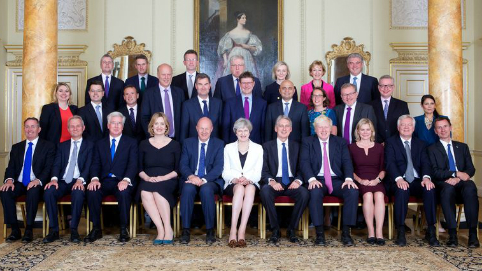Theresa May needs more than words to rebuild her team
Leaders must regain trust after failure through their actions, says LBS strategy expert

Her new Cabinet managed to smile for their official team photo but the UK’s Prime Minister Theresa May has three great challenges ahead, according to Dominic Houlder, Adjunct Professor of Strategy and Entrepreneurship at London Business School.
Firstly, the PM needs to re-establish her commitment to purpose. “In turbulent times people place their trust and confidence in those who can provide stability,” he said. “Theresa May had the mantra ‘strong and stable leadership’, but she had no proposal for Brexit. There was a mismatch between her words and deeds.”
Likewise, in business, “Corporate purpose can often degenerate into something that’s been wordsmithed by identity consultants or be simply treated as the brand. But the brand rests on a whole web of commitments that must be fulfilled. Once that web breaks, the purpose gets lost and the trust is broken.”
Secondly, said Houlder, bosses in political and corporate life don’t have absolute power but rely on coalitions. “Had Theresa May stuck to her earlier conviction not to have a hard Brexit, she might have been able to put together a different coalition. When you’re forming a coalition you need information and insight. If you’re relying too much on two key advisors you may get over-filtered information and may lack the insight on who to bring on board and who to keep well out of harm’s way.”
Thirdly, he said, leading a team through turbulence requires clear ground rules. “There’s a great deal of potential for confusion, miscommunication and mess. One of the crucial roles as a leader is to be really clear about which stage of the execution you're in. If the direction is not yet set, you need to be open to discussion. That’s the time to relax the boundaries of the team and open yourself to insights that might come your way.”
There is then a time for hard choices, said Houlder, but in a time of crisis, good leaders build in an iterative execution process. “In a turbulent environment you’re always going to get things wrong. Pretending it didn’t happen or immediately falling on your sword is not helpful. Research shows that the quality of decisions is hugely improved when it’s clear how the decision is going to be made. Who’s going to be accountable for what?” Leaders should make it clear at the outset that their team will bear collective responsibility for the outcome.
“Leaders look weak when they appear not to anticipate potential failure,” he said. “Better to be upfront that we’re clear we’re basing this decision on a set of assumptions that we can track to decide whether or not to bring about a change of direction.”
He compared the British electoral system to those in other parts of Europe that involve some element of proportional representation. In that context, he said, coalitions are inevitable, leaders continually have to revise their campaign policies and there is “a healthy process of climbing down, eating a bit of humble pie and not trying to cling on with your fingernails”.
Houlder cited Lord John Browne, former CEO of BP, as an example of a business person who has bounced back (after having his personal life cruelly exposed by a tabloid newspaper). “He has recovered magnificently because he had friends. People felt that he given so much to others and had a lot to offer the world, so there was a lot of rallying around and helping him to climb back.”
There are fewer examples of business resurrections – instances where a business regains its reputation without changing leader. This will be the challenge for May. “Who you are to a great extent is a construct of how others see you and the expectations they have of you,” said Houlder. “You may be able to wash the disaster off you like water off a duck’s back but someone else will usually have to rebuild.”
In the venture capital world, he pointed out, investors know that many of the businesses they invest in will fail but it doesn’t mean they write off the entrepreneurs. Similarly, young corporate managers are usually expected to learn from their failures. Political leaders? Not so much.




